One of the main activities of the Adolescent Project in Arain-Sarwar was the long and short duration residential training camps for adolescent boys and girls. These camps, while providing the essentials of basic education, conveyed the ideology of holistic education for leadership through organised action for community benefit. The residential camps (both long and short duration) run by the project have been the source of creative and pro-active education since the first year of their inception. It has also been challenging as many of the adolescents joining these camps have been first generation learners. These camps have, therefore, focussed on innovative efforts towards integrated education.

Prerna Kendras (PK) were started to provide continuing education to adolescents, especially in villages, where adolescents had participated in large numbers in the camps organized by the project. In 2006, 4 Prerna Kendras were started. These emerged as multipurpose centres – with a library, an information centre and as a forum where community members and adolescents could discuss various issues pertaining to the development of the village. Each Prerna Kendra had an Incharge/Instructor to coordinate the various activities in the Kendra both inside and outside the Kendra. The Incharge had the responsibility of organising various learning events and activities for adolescents in and around the village. They also had the responsibility of tutoring students who were preparing for the Class VIII and Class X examinations through the Open school system.

Formation of women's groups was viewed as an entry strategy into new villages and also as a mechanism for encouraging families to send their non-school going children to the residential camps. In 2006 women's meetings were organised in different villages wherein a number of issues affecting women's lives were discussed and the need to form a collective emerged. Gradually, due to the efforts of the team members women started participating in project activities.
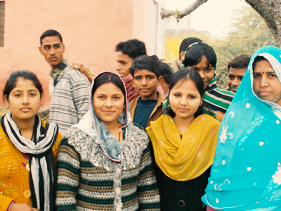
Life skills training camps
were organized since the beginning of the project. The participants were drawn from among school-going children and adolescents who had dropped out. The duration of these trainings was 4-5 days. The first day usually focussed on familiarizing the participants with each other and making them comfortable in the training venue. The learning needs were outlined by the trainers and an attempt was made to help them go beyond their individual experiences and to appreciate what has been inaccessible to them so far.
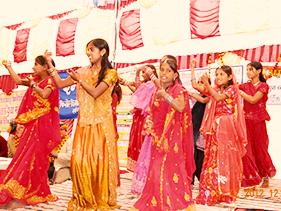
Pandies' Theatre,
a Delhi-based activist theatre group, has been training marginalized children to create theatre that articulates their perspective on their problems. The group, using theatre as a politically empowering tool, does not envisage the role of theatre as merely one of confidence building or personality development but a methodology that enables those on the margins to make contributions to the social process, a space usually denied to them by the powerful. The Pandies’ Theatre group was associated with the Adolescent project in Sarwar with a focus on empowering communities on the margins so that they can articulate their perspectives and also making the mainstream acknowledge their contribution as important. It has been a longterm partnership. Pandies' Theatre organised several workshops over the project period in which number of adolescents participated.
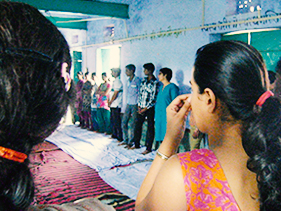
The work with school systems has been an intrinsic part of the adolescent project in Sarwar. Focussed work on with schools began in September 2009 in 7 schools of the project area. A total of 145 adolescents in schools were addressed.
Different activities were organised with school students i.e. essay writing, training on LSE, debate competitions and leadership development. Consequently, systematic work was carried out with teachers and students of government schools in different clusters. During the period 2009-2015, approximately 6064 adolescents and 100 teachers have participated in various activities with government schools. These included:
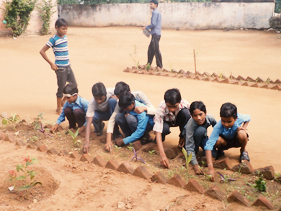
The micro planning process adopted from Doosra Dashak combined the monitoring of participants, reviewing the project outcomes and planning for the future. Project implementation was seen to be facilitated through sustained contact with participants, assessment of the quality of residential training, followed by monitoring at six monthly intervals. A bench mark was established Micro Planning Process 46 at the outset through an understanding of the level of skills of the participant. An assessment of progress was further made at the end of a residential training and later monitored at six monthly intervals.
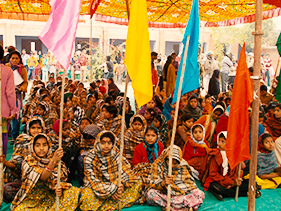
Since the project was challenging and required developing an understanding on a range of issues impacting adolescent lives, professional development of the project personnel was an intrinsic activity and viewed as process of human development. New knowledge and skills were acquired through specialised trainings, mutual learning and critical reflection on practice. The team members were encouraged to participate in various training programmes and issue based workshops. Exposure visits were also organised to different organisations.
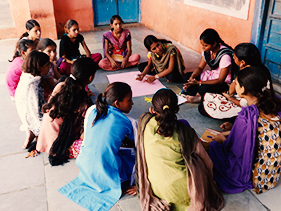
Development initiatives even though small in scale can serve as a valuable reference points. Today, considerable progress has been made in access to elementary education in Rajasthan. There are more girls enrolled in schools as compared to 2006 when the project started in Arain. The experience of the Adolescent Education and Development Project in Arain block suggests that providing holistic education, integrated to lives of adolescents in a context of multiple disadvantages and deprivation can be extremely challenging.
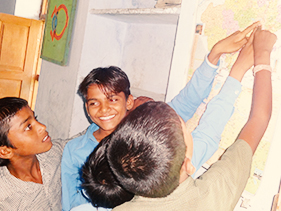
Ajmer Adult Education Association
Kanta Marwah Bhawan,
Vidyut Marg, Shastri Nagar Extention, AJMER 305006